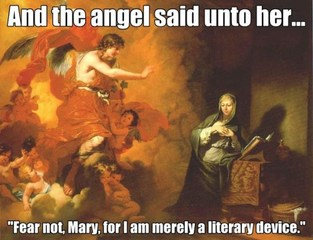1. To be full of the grace that saves is surely to be saved.
2. To be full of the grace that gives us the power to be holy, righteous, and without sin is to be fully without sin, by that same grace.
A deductive, biblical argument for the Immaculate Conception, with premises derived directly from Scripture, might look like this:
1. The Bible teaches that we are saved by God's grace.
2. To be "full of" God's grace, then, is to be saved.
3. Therefore, Mary is saved (
Luke 1:28).
4. The Bible teaches that we need God's grace to live a holy life, free from sin.
5. To be "full of" God's grace is thus to be so holy that one is sinless.
6. Therefore, Mary is holy and sinless.
7. The essence of the Immaculate Conception is sinlessness.
8. Therefore, the Immaculate Conception, in its essence, can be directly deduced from Scripture.
The only way out of the logic would be to deny one of the two premises, and hold either that grace does not save or that grace is not that power which enables one to be sinless and holy.
It is highly unlikely that any Evangelical Protestant would take such a position, so the argument is a very strong one, because it proceeds upon their own premises.
In this fashion, the essence of the Immaculate Conception (i.e., the sinlessness of Mary) is proven from biblical principles and doctrines accepted by every orthodox Protestant. Certainly all mainstream Christians agree that grace is required both for salvation and to overcome sin. So in a sense my argument is only one of degree, deduced (almost by common sense, I would say) from notions that all Christians hold in common.
Read more:
https://www.catholicfidelity.com/apologetics-topics/mary/full-of-grace-and-the-linguistic-and-exegetical-considerations-by-dave-armstrong/





